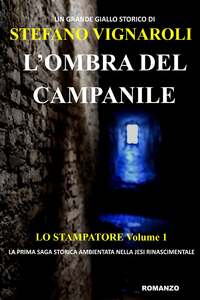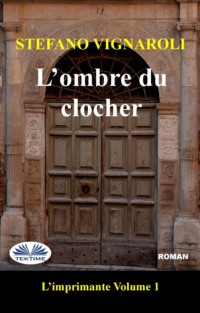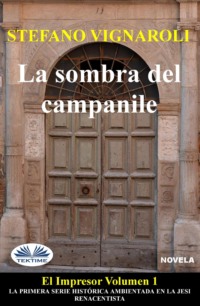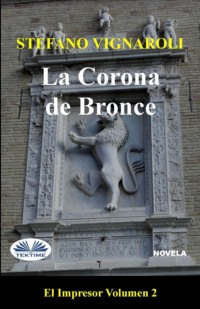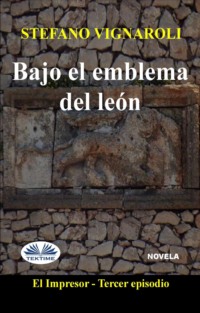
Полная версия
The Shadow Of The Bell Tower
Franciolini and his men were not ready for battle, they were not wearing armour, they were going to a party and only had light weapons with them.
«Betrayal!» said Guglielmo, getting off his horse and facing a Spaniard armed with a short dagger. «Chain the streets, don’t let them go down into the valley, or they’ll open the gates to the army of Ancona, and we’ll be caught between two clamps.»
Only with the strength of his arms and his short dagger, he had already landed two Spaniards, leaving them in a pool of blood. Guglielmo was a skilful fighter, and he was quick to catch the enemy. As soon as he saw his opponent hesitant, he would stick the knife in his heart, then pull it out, clean the blade on his clothes and start fighting again. The enemy vanguards didn’t wear armour and it was easy to be right with them. But the enemies came out of Via del Fortino by the dozens, by the hundreds, like a flooded river whose banks could not hold back the water. A Spanish crossbowman took aim and pointed his weapon at Andrea, who was still proud on his horse. The young man had found himself in the middle of the battle at other times and had not given importance to the fact that at the moment he was not wearing armour, but a colourful brocade suit. He had his steed soaring to the fray when he was hit in the right thigh. Other arrows reached both horse and rider. Andrea fell to the ground, with at least four darts piercing him. His horse, hit in the chest, ruined his heavy body on top of him. He tried, without succeeding, to slip away from the mass of the heavy animal, but the forces were abandoning him. Guglielmo, aware of his son who had landed, turned towards him, distracting himself from the fight and turning his back dangerously on the enemy to come to his aid. He saw Andrea’s eyelids drooping, called out to him, but had no answer. He realized that his cadet was now unconscious, perhaps dying. Just at that moment a long blade pierced him, penetrating from behind his back, making its way between his ribs, cutting through his heart and coming out of his chest, accompanied by a powerful stream of blood. Guglielmo barred the eyes that, at the moment of the passage, were still staring at the brave and agonizing son.
Easily right of that small handful of men, Spaniards and Gascon spread through the streets of the city. Some went up Via delle Botteghe up to the Porta della Rocca, surprising the soldiers on guard, killing them and opening the door. Others went down to the valley to open Porta Valle and Porta Cicerchia and thus facilitate the entrance into the city of the Ancona army, which had been waiting for days for nothing more than that moment. Although taken by surprise, the inhabitants tried to organize a defence inside the town, spurred on by some nobles, in particular by Fiorano Santoni, who immediately gathered a squadron of people who, chained the streets as arranged by the People’s Capitan, prepared to fight the enemy in the streets, alleys and squares. But the latter, strengthened by the contribution of the Ancona’s people, was too numerous and the Jesi’s inhabitants, humbled by the cries and tears of women and children, abandoned the defence.
Above all, the mercenaries in the pay of Francesco Maria Della Rovere were thirsty for pillage and the inhabitants, considering that they had not been able to save their homeland, tried at least to save their property, but even in this they had no success: the rich gentlemen were taken prisoners and their women, who had tried to escape, with their jewels, in the churches, saw themselves reached by the Spaniards even inside the sacred places, where they did not disdain to strip them of what was precious on them and rape them. At a certain point, a woman, Eleonora Carotti, with a haughty and male bearing, managed to slap a Gascon who was placing his hands in her breast to take away the jewels he had hidden there and at the same time take advantage to grope her. She found herself between him and another group of Spanish soldiers. If the slapped Gascon had been astonished, without reacting, the others had not lost heart, they landed the damsel, stripped her of her clothes and, making sure she was a woman to all intents and purposes, had raped her one after the other, holding a knife to her throat. The last soldier, having reached his unhealthy pleasure, sank the knife, cutting her throat mercilessly.
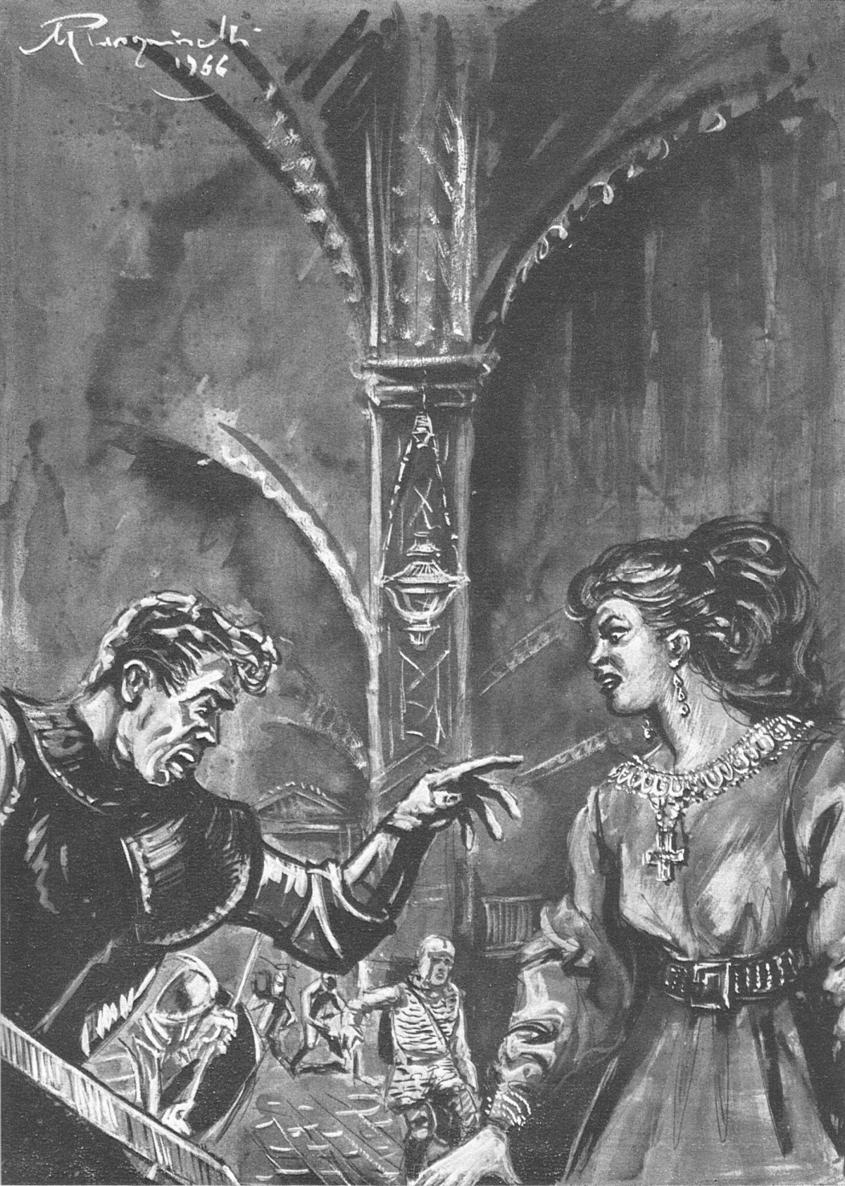
The sacking of Jesi lasted eight days, many palaces were set on fire, some with the inhabitants inside, bound so that they would burn alive inside their homes, guilty that the looters hadn’t found enough money or valuables to take away.
There was no respect even for sacred things, nor for religious people, and many priests were tortured and tortured to confess where they had hidden the church ornaments. The plundering spread to the whole countryside and no place, city or country, was spared.
Baldeschi Palace, which had been barred the whole time, on the eighth day opened its doors to Grand Duke Francesco Maria della Rovere and Duke Berengario of Montacuto, who were welcomed in conversation by the Cardinal. The latter had in fact arrogated to himself the right to negotiate the surrender with his adversaries, being no longer present in the city a higher civil or ecclesial authority than he was.
After the servants had offered wine of cherries and sweets made with sultanas, at the Cardinal’s nod, they withdrew and closed the three men alone in the study.
«You have gone too far. The agreements were that you would find no obstacles and you would have to kill Franciolini and his son, taking over the city. An easy conquest, instead for days and days you sowed terror, destruction and death», thundered the Cardinal addressed to the two Dukes.
«No self-respecting army, especially if made up of mercenaries, renounces the spoils of war», replied Della Rovere in a calm tone, almost bored, concentrating his gaze on the nail of the little finger of his right hand, perhaps regretting the fact that during the fighting this had broken. «We kept our word. Now you keep yours, and we will retire in good order, leaving you the undisputed Lord of this city.»
«So be it!», continued the Baldeschi, swallowing the toad, and still satisfied in his heart of how the operation had gone. If several of our fellow citizens had left us, worse for them, it was no big deal. «As promised, I will intercede with the Holy Father so that you, Grand Duke Della Rovere, may have your lands and title returned. You may retire to Urbino and be respected forever by your subjects. As for Ancona, dear Duke, within a month I shall have ten thousand gold florins poured into the coffers of your city, which will serve to enlarge and fortify the port, but the merchants of the city of Jesi must be guaranteed a commercial port of call. And now, withdraw your armies.»
Francesco Maria Della Rovere finally gave the order to his troops to leave the city. The invaders left with a caravan of a thousand beasts loaded with all God’s goods, as well as a large lot of money, valuables and artillery pieces. For his part, the Montacuto, not fully trusting the word of the Cardinal, withdrew the bulk of the army, but left a garrison in Jesi, which would leave only after the defeated city had paid what was agreed.
In those days, Artemio Baldeschi had been too focused on the course of events, to look after what his sister and niece were doing, and he had not even noticed that the girl had disappeared since that famous Thursday evening. The two maids, the blonde and the brunette, Mira and Pinuccia, who were waiting for the Cardinal’s sure rant the moment he finally noticed her, were well aware of her absence. The two maids knew very well that, from that evening, Lucia was locked up in the Franciolini’s house, intent on curing Andrea, who had been seriously wounded in the clash with the enemy, and they knew very well that if the girl’s uncle found out, he would be even more furious.
On the evening of the party, Lucia, having finished dressing, had gone out onto the balcony of the palace overlooking the square below to watch the procession of the nobleman Franciolini arriving on the opposite side, from Via delle Botteghe. It was dusk and it seemed that everything was going well, that everything was quiet, and the bad feeling she had felt just before had already vanished. But suddenly, from Via del Fortino, more and more armed men had begun to appear, more and more numerous, who had immediately engaged in battle with the men in the procession following the People’s Capitan. He had seen his beloved Andrea struck by arrows, and had seen Guglielmo shot dead from behind. That coward with a huge sword had taken advantage of his moment of distraction, for having seen his wounded son, to hit him from behind. Lucia could not watch helplessly that horror, she had to run to Andrea’s aid, who beyond the arrows, was oppressed by the weight of his horse that was ruined on him, perhaps lifeless. She rushed down the stairs and gained the entrance hall; she was about to open the front door when she realized that the fighting was raging throughout the square and that it was not appropriate to go out of there. She entered the stables and spotted the side service door, the one used by the stable-keepers, which overlooked the alley. The wooden door was bolted with a bolt from the inside, it was easy to open it and find herself in a dark and smelly alley a few meters away from the ancient Roman cistern. A few steps and she would have been in the Piazza, on the side of the church of St. Florian. To avoid being noticed by the crowd of fighters, and cross the square unscathed, he had to use a stratagem. Just a few days earlier, her grandmother had taught her a sort of invisibility spell. Not that it made her invisible in the true sense of the word, but it made her go unnoticed by others. She hoped that it would work, recited the formula and began to cross the square, always keeping close to the walls, first of the convent, then of St. Florian Church, then those of a recently built building, the Ghislieri Palace, arriving at the corner where both Via del Fortino and Via delle Botteghe appeared in the square. If she had arrived there thanks to the spell of invisibility or because no one had taken care of her, so busy in the battle, she was not allowed to know. The fact is that she had come to the square with her agonizing love. As many as four arrows had hit him, two in his right leg, one in his left shoulder, the last one passing through his right arm at the biceps muscle. He had lost a lot of blood, and was in a state of semi-unconsciousness, his left leg crushed against the pavement by the weight of the horse’s torso. Lucia focused on the dead beast, ordering with her mind her partial levitation. The change of position of the animal was almost imperceptible, but it was enough that, starting to pull Andrea by grabbing him under the armpits, the girl managed to free him from that unfortunate position. The young man’s eyes, as if by magic, regained light, staring at the girl’s eyes for a moment that she thought sublime, then turned backwards, while Andrea lost consciousness completely. Lucia did not despair, she placed two fingers on her beloved’s jugular shower and could feel a faint pulse.
All is not lost, she thought. Life hasn’t abandoned him yet! But I must act quickly if I’m to get him to safety.
Trusting in her powers, but also and above all in the power of despair and in the deep love that Andrea’s inspired to her, she began to drag his inert body, realizing that she was not even making a superhuman effort. She extended the spell of invisibility to her young love and headed down the Longobard Coast to reach Franciolini’s Palace. None of the men who were fighting in the street gave them a glance, continuing to cross their weapons and fight as if Lucia, with her heavy burden, did not even exist. When she stood in front of the door of Andrea’s house, she laid her lifeless body on the ground and dwelt once again on the decorated tile that had intrigued her so much, the one representing a seven-pointed pentacle. But it was not the time to let herself be taken by distractions. She grabbed the clapper attached to the door and began to knock with how much strength she still had. One of the servants at Franciolini’s house, a muscular dark-skinned man with a turban on his head, whom the People’s Captain had bought as a slave on one of his trips to Barcelona, opened the door just a crack to make sure that no enemies were knocking at the door. When he realized the situation, in the blink of an eye, he let the girl in and dragged the young master inside.
«By Allah and Muhammad, blessed be their name, may I be forgiven for naming them. What about the Captain?»
«The Captain is dead, and if, instead of wasting time invoking your gods, you don’t do as I say, the same end will be reserved for your young master!»
«There doesn’t seem to be much for him to do. In a few moments his soul will leave him to be reunited with that of his ancestors, and that of his father, may Allah have him in glory.»
«He’s not a Muslim, so Allah will not have him in glory. We can still do something for him. Take him into his room and lay him on his bed, then follow my instructions and leave us alone.»
Chapter 3
Alì did exactly what Lucia ordered him to do. In the pantry he had found all the herbs the girl needed, including willow bark, whose function he was unclear about. It would never be used in the kitchen, yet her owners kept a good supply of it in carefully sealed jars. Only then the Moorish servant had realised that the pantry was more of a herbalist’s shop than a storehouse of edible things. There were those too, yes, but many of the herbs in the jars he knew well were used by Jews and sorcerers for purposes contrary to the teachings of both his religion and Catholicism. After all, the Christian God and the Muslim God were very much alike, and if a man was destined to die, his own God would take him in glory and be happy alongside him. One could not claim to save the life of one who was already destined to join his Almighty Father in the kingdom of heaven. This was what Alì thought, as he crossed the Piazza del Palio and went up the Shepherds’ Coast in great stride, taking care not to run into the scuffles that had spread so far. He stopped in front of the door indicated to him, the one on whose headboard was written “Hic est Gallus Chirurgus”10 .
Another sorcerer!, brooded Alì between himself. He calls himself a surgeon, but I know he is the brother of Lodomilla Ruggieri, the witch who burned alive in Piazza della Morte a few years ago. If I don’t pay attention and try to get away from these people, I too will end my days on a burning pile. And even my masters are in it up to their necks, I can only understand now what kind of heretics I have served for years!
Then he realized in his mind that, belonging to another religion, the Inquisition could not prosecute him, and he decided to knock. A tall, sturdy man with mighty biceps, long hair gathered at the back of his neck in a ponytail, and a beard that had not been shaved for a few days, he looked him from top to bottom. Alì was also strong: in his native country, in the upper Nile valley, he was a wrestling champion, there was no one who could beat him, and the man in front of him was unarmed, so he looked at him and told him what he had to tell.
«I see, I’ll get my tools and I’ll follow you. Wait for me here, Franciolini’s palace is a short distance away, but I prefer to make the journey in your company. The two of us could better deal with any troublemakers.»
Gallo disappeared for a few moments inside his house and reappeared with a heavy calfskin bag, which contained the tools of the trade and which, judging by their appearance, must have been very heavy. They crossed the square passing by people who were fighting bitterly. The surgeon recognized a friend of his from Jesi who was shot down with a sword and rushed to help him. But Alì was quick to pull him by the arm and make him give up his intention. It was not really the case to get noticed and engage in a battle that had taken a bad turn for the inhabitants of the city. It was more urgent to rescue his young master... Alì and Gallo quickly slipped into the door of Franciolini’s palace, which the Moor provided to bolt from the inside. He would no longer want to stick his nose out of there even for all the gold in the world, until the fighting had subsided, not knowing that he would soon be forced to leave for an even more dangerous commission than the one he had just completed.
Alì watched Gallo gently extract three arrows from Andrea’s body, while Lucia, at his side, was ready to dab the blood that was spilling as soon as the sharp weapon was extracted, using freshly laundered cloths and applying the herbal poultice that she herself had prepared in the kitchen. The last arrow, the one that went through the young man’s arm from side to side, didn’t want to get out, no matter how hard Gallo pulled.
«Bastards, they used arrows with rostrums, they only go forward, you can’t pull them back. I will have to break the rocker tail and take out the arrow from the front, cutting with the scalpel the skin of the arm at the exit hole, but I will risk to cause a fatal haemorrhage. Are you ready to swab?»
«Yes,» replied Lucia, «I’m ready!»
Alì realized that only the force of despair prevented Lucia from fainting, even though her eyesight and the ferrous smell of blood were probably dulling her senses. Realizing that the girl would not be able to attend Gallo again, Alì took a deep breath and, as soon as the surgeon finished pulling out the arrow, he rushed to stop the copious bleeding. In less than an instant, the rag he was holding in his hand was completely dyed red, and made him feel a very unpleasant slimy sensation to the touch. Alì had never felt anything like it in his life, but he had to be strong. Gallo tore a strip of sheet, tying it tightly around Andrea’s arm, upstream of the wound. The flow of blood slowed.
«We can’t leave the arm so tight for long, or we will lose it and then I will be forced to amputate it because of the gangrene that will surely form. I need a powerful coagulant and healing agent, and the most powerful is human placenta extract. Alì, you have to go to the midwife, she always has dried placenta and...»
«But, the midwife lives outside Porta Valle, it’s too dangerous to go there!»
«Then I guess there will be little we can do for the boy.»
Luckily, Alì knew a passage that, through the cellars of the palace, led outside the walls, near the valley, where a guild of county workers, led by the Giombini family, were building a new mill for milling grain. As he emerged from the little door that opened in the eastern walls, well hidden by a thick bush, he regretted the sight of the mill being built, which had been partially razed to the ground by the fury of the enemy. But he could not dwell on that detail. The semi-destroyed structure offered him shelter from the sight of the a soldier from Ancona, who was continuing to enter the city through Porta Valle. Alì went decisively towards the small church of Saint Eligio, near which Annuccia, the midwife, lived. The midwife, when she saw the Moor, was frightened at the time, thinking that the invaders included the Saracens, then she recognized Alì and let him into the house.
«Are you crazy walking around here? I was about to kill you with this», Annuccia told him, showing the chimney wing she was holding in her hand. «I’m not about to give up and get raped by this rabble!»
«I need help for my Lord, Annuccia. The Captain has been killed by the enemy and the young Lord is wounded and needs urgent care.»
After a few minutes, Alì left the midwife’s house, jealously guarding what the midwife had entrusted to him and for which he had had to pay out as much as three denarii of silver. He returned to the little hidden door , coming back to Franciolini’s Palace, handing over the precious casing to Gallo. The surgeon took the dry placenta, put it into a cauldron of boiling water, added a few herbs, including the rare Devil’s Claw, and within half an hour he obtained a thick, unpleasant smelling poultice, which he placed in a clay pot. Alì took the pot in his hand and followed Gallo to Andrea’s room, where Lucia was cleaning the blood on the young man’s half-naked body. The surgeon trained the rudimentary tourniquet, while the girl applied an abundant layer of poultice to the wound, then wrapping a fairly narrow band, but not too much, around the injured limb. Andrea, in his semi-unconsciousness, made a grimace of grief, which cheered up all those present: he was still alive, and alert, even if very weak.
«I can’t do more than this. The next few days he will need constant assistance, his fever will rise, you will have to cool his forehead with wet patches and let him ingest infusions of willow bark, hoping that he will be able to overcome not only the abundant blood loss, but also the infection that will form. If green pus starts to come out of this wound, you can start to say goodbye to him. If, on the other hand, you see yellow pus, what we surgeons call “bonum et laudabile”, it will mean that he is healing. But you, Lucia, don’t stay here for long: your uncle will soon notice your absence, and then I think you will be in trouble. Train the Moor to assist his young master and return home.»
«May it never be so», replied the young lady. «I will be by his side until he is healed. He is my betrothed and I want to be beside him now.»
«Betrothed, you say? Well, I think it was your uncle’s intention not to let him walk down the aisle. I’m no fortune teller, but I think today’s party was all a farce to get the enemy and death for the People’s Captain and his cadet. Do you realize that now your uncle is the highest religious and political authority in Jesi? Do as you wish, but I don’t think the Cardinal is happy to see you here looking after the cadet of the Franciolini house.»
Gallo picked up his instruments, cleaned them carefully, put them back in his purse, greeted the girl with a smile, and the Moor proclaiming: «Salam Aleikum, peace be with you, brother, and thank you for your precious help.»
«Aleikum as salam, thank you for the precious care you gave my master, I’m sure he’ll be all right.»
«Perhaps out of his wounds», said Gallo, closing the heavy door behind him. «But certainly not from the clutches of Cardinal Artemio Baldeschi.»
Over the next four days, Andrea fell prey to a fever, accompanied by his chills and delusions. Lucia had been close to him the whole time, doing exactly what Gallo had advised her to do and everything she knew about having learned from her grandmother Elena. In his delirium, Andrea often mentioned the witch Lodomilla, talked about the strange symbols drawn in the portal tile together with the seven-pointed pentacle, talked about a Jew who had initiated him to a particular kind of knowledge, sometimes appointed the biblical king Solomon, sometimes one of the wives of Emperor Frederick II, Jolanda of Brienne. She often pronounced, among other confused words, the name of a place, also known to her: Colle del Giogo. That place, which was located in the nearby Apennines a couple of days walk from Jesi, reminded her of the ritual with which, a few months earlier, she had officially joined the sect of witches worshippers of the “Good Goddess”. A few days before the spring equinox, her grandmother had told Lucia to be ready, as on the night of March 21st they would join the other followers of the coven up at Colle del Giogo, in the mountains of Apiro.
«Uncle says they are pagan rites, that most of the followers are heretics and sorcerers to be burned at the stake.» Lucia was a bit afraid, but curiosity outweighed fear. «Don’t you think it’s dangerous to attend this meeting, this Sabbah, as you call it?»
Her grandmother had tightened her shoulders, as if to say that she didn’t give a damn about what her brother thought, and answered her very naturally.
«When we speak of divinities, we speak of supernatural entities, which with their infinite goodness can show us paths to follow, paths that only with our eyes we would never be able to see. Now, if the true God is the Almighty Father proclaimed by your uncle, the Yahweh invoked by the Jew who lives in the little house down by the river, the Allah in which the Muslims believe, the Zeus of the Greeks or the Jupiter of the ancient Romans, where is the difference? Everyone can call God in his own way and receive the same favours, no matter what is the name he use. And if we are men and women here on earth, even in heaven, or in Olympus, or in the garden of Allah, there will be female gods. The one we worship as the “Good Goddess” was known to the Romans as Diana. Look, look at the facade of our palace. Look up: What do you see in a niche between the windows on the top floor?»


